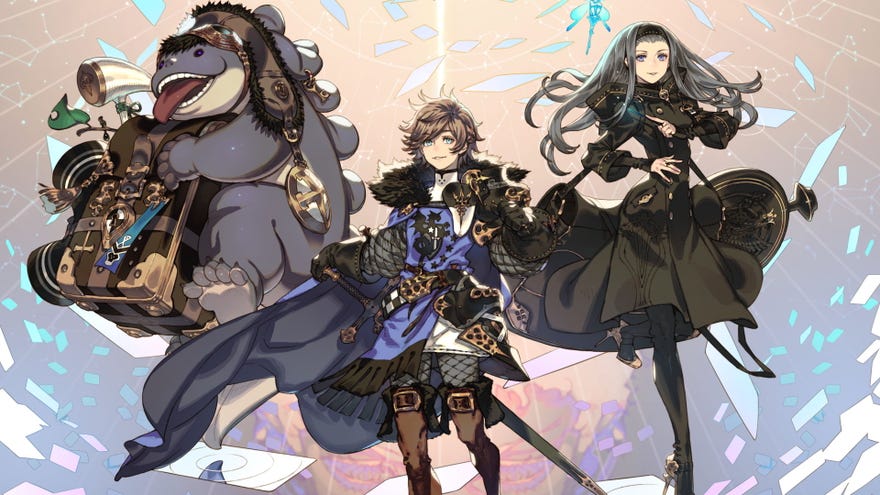Voice Of Cards: The Isle Dragon Roars review: a JRPG in card game cosplay
Taro cards
Card games are all the rage these days, so much so that even Yoko Taro of Nier: Automata fame is getting in on the action. Alas, if you’re expecting a similarly galaxy brain take on tabletop RPGs here, you’re going to be disappointed. Despite the creative minds behind it (Automata’s producer Yosuke Saito and composer Keiichi Okabe are also on board), Voice Of Cards: The Isle Dragon Roars is a decidedly simple role playing affair where its titular cards are nothing more than a fancy visual layer papering over a by-the-book tale of dungeons and, yes, a dragon. Inscryption this ain’t.
To its credit, Voice Of Cards is at least pleasingly breezy. At a little over ten hours, this is one RPG that doesn’t outstay its welcome. Wryly narrated by a disembodied game master, chapters are brief and to the point, often consisting of visiting a single town, collecting information from villagers to move along its story of hunting down an ominous, world-ending dragon, and plundering a single dungeon. There are no sidequests to speak of to bog things down further, but that doesn’t mean the world around you is entirely empty.
In a rather playful nod to its card-based roots, this is a map that's discovered piece by piece as you move your pawn-like character marker across it, flipping over adjacent tiles of grass, forests, beaches and more as you progress. It's not a huge world by any stretch, but hop your pawn away from the beaten path and there's a bevy of chests to discover that contain rare weapons, as well as a handful of world events and the odd NPC itching for a fight. These world events are rather shamefully recycled over the course of the game, but hey, I’m never one to turn down clues to yet more stat-boosting treasure, nor am I the type to pass up the chance to take down special monsters to earn some mega EXP bonuses.
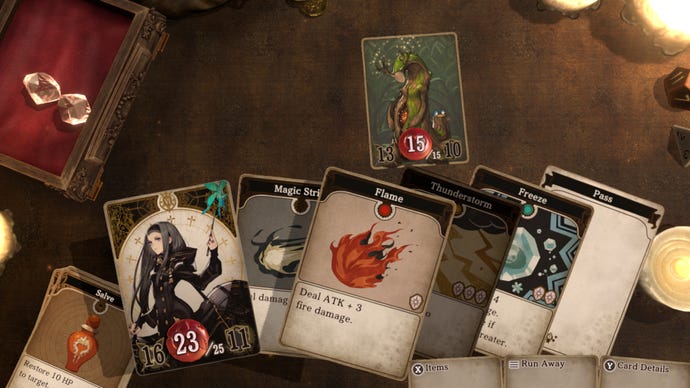
Despite you, the world and its monsters all being made from cards, there’s really not much of a card game to speak of here.
Not that you’ll ever really need any mega EXP to see you through the bulk of its combat. Despite you, the world and its monsters all being made from cards, there’s really not much of a card game to speak of here. Indeed, strip away its (quite literal) paper-thin aesthetic and you could easily mistake Voice Of Cards for a typical JRPG. Battles occur randomly as you jump and hop around the map, but they aren’t won through careful card placement or cunning strategic plays. Instead, at the beginning of each fight, your party of three - built from five possible options of your classic swordsman, a dainty mage, a woodland archer, and two muscular tanks – will shuffle onto the wooden battle board and square off against their foes in classic turn-based fashion.
Each character has a deck of four cards to choose from, but when these attacks are fixed for the course of the battle, it's really no different from nosing through a battle menu in a Final Fantasy game. More powerful attacks often require the use of gemstones, which slowly accumulate at the start of each turn, but the cost of these cards is often so low that you'll rarely need to even think about your gem count at all. There are also the usual elemental strengths and weaknesses to consider, that’s about as deep as it gets. The only nod to anything remotely tabletop here is the odd dice-roll determining whether you land a winning freeze, paralysis, burn or poison debuff.
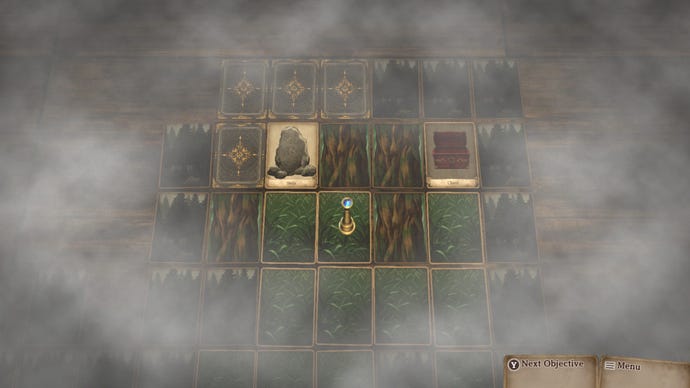
This wouldn’t be so bad if enemies constantly kept you on your toes, but while the frequency of battles is often high, the variety of monsters you’ll face is pitifully low, making it easy to fall back on a few winning strategies and little else. Worse still, when you're out on the map, you can effectively fast travel to any turned over card, making it exceedingly easy to cheese your way to victory. Been battered by a particular difficult fight? Well, why not whizz back to the nearest town, heal up completely free of charge, and whizz on back again and carry on where you left off? It was only toward the end of the game that battles started to become even remotely taxing, but by that point I was so over-levelled that most encounters still ended up being a bit of a cakewalk. I won’t knock its final boss, though. That was a real pig.
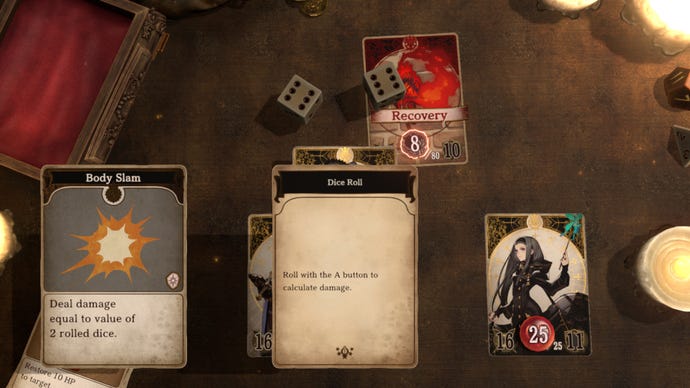
Still, it’s an ending soured by a dissatisfying conclusion. Even the jaunty, uplifting folk score couldn’t prevent me from casting my controller aside in a fit of rage once the credits rolled (for this is a game that's definitely built around a controller, not even deigning to provide mouse and keyboard prompts despite offering it up as a control option in the bafflingly named 'Set Confirm' settings).
Yes, this is a game that locks its 'true' ending behind tedious collectible doodads - and I'd only found eight of them during my travels, not the full ten. Sure, you'll come across most of these 'mysterious cards' simply by engaging with NPCs you meet in its towns, but a few tricksters are hidden in chests and other world events off the main path. It feels decidedly mean-spirited in a game that demands so little from its players elsewhere, and I simply didn't have the strength or patience to go back and find them, or indeed defeat that final boss all over again to see it through.
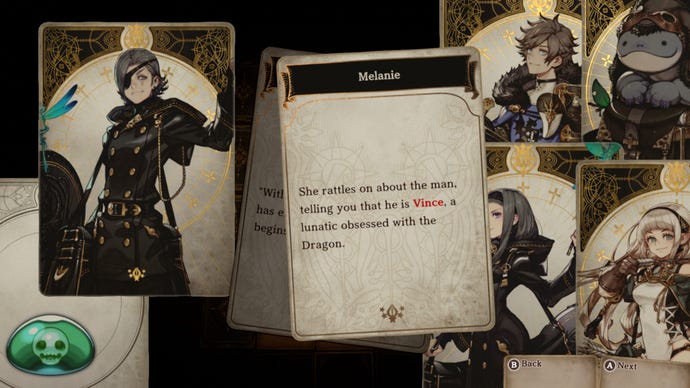
After all, ten hours might be quick by normal JRPG standards, but toward the end it really started to drag. If the endless grey and brown tiles of its dungeons weren't tiring enough, the combination of its repetitive battles, the slow slide of its card animations and the one too many seconds it takes to jab over to the run menu meant I was yearning for a fast forward button in the style of Bravely Default II before I'd even hit the halfway mark.
It's a shame Taro wasn't able to get more out of Voice Of Cards. I feel like there's much to admire here, from its light and approachable style of battling to its enjoyable and occasionally daft story moments. Taro's commitment to the whole card schtick is commendable, too. Deaths in battle are rendered as violent card tears, while status effects crinkle and crease them with a pleasing sense of polish. Discovering the world a clutch of cards at a time is also surprisingly moreish, even if the resulting tiles underneath are no more complicated than a retro Final Fantasy map. But there are better card games out there that are more deserving of your time than Voice Of Cards. It simply cannot match the dramatic strategic plays of Slay The Spire or the onion-like layers of Daniel Mullins' Inscryption, and if it's proper dungeon crawling tabletop trappings you're after, then get thee to Defiant Development's Hand Of Fate series. Rather than roaring triumphantly into the popular genre of the day, Voice Of Cards ends up being little more than a whimper.
